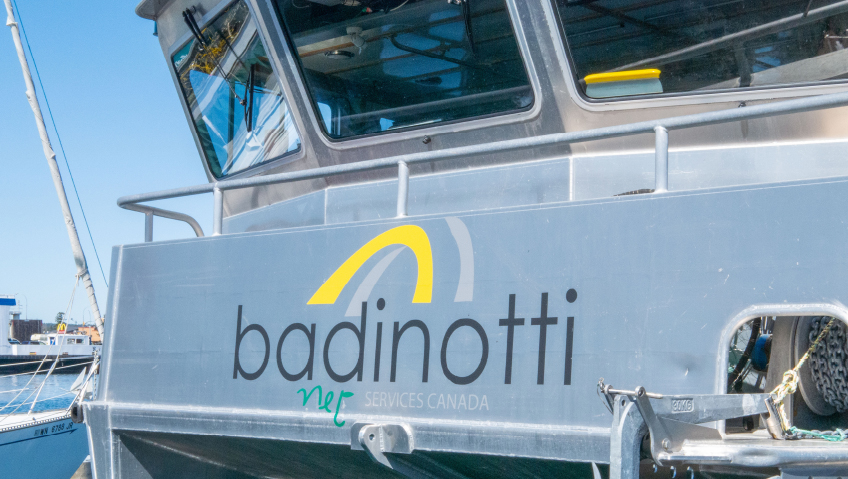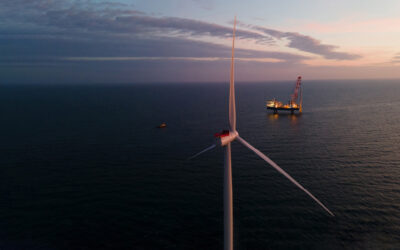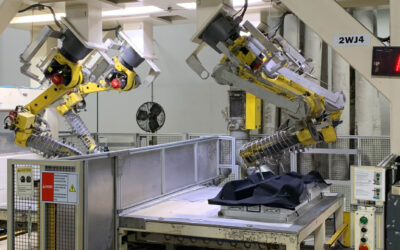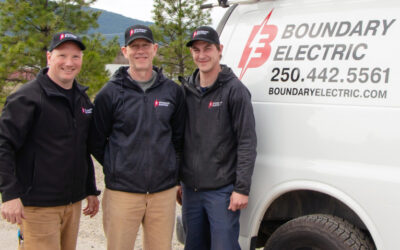Badinotti Net Services Canada is the Canadian branch of the Badinotti Group, an international manufacturer of innovative netting products for aquaculture, fisheries, safety, and even sports. The Canadian branch of the company aims to leverage more than one hundred years of global experience toward helping clients in local markets.
For businesses in every industry, 2020 was a complicated period of unpredictability and adjustment. For the Canadian netting company, this time was used to analyze its processes and methods of interacting with its customers. Traditionally, most of its processes had a hands-on approach, based on in-person meetings that included a heavy paper trail. In the last year, the pandemic has been a springboard for Badinotti to pivot its strategy and adopt its own digital platform to improve its cloud based network.
“This past year was extremely challenging, but it created internal pressures on us, and pressure produces growth. It made us look at everything in a new light, and it allowed us to consider these other strategies that we may not have otherwise prioritized. We developed tools to interface with our own employees first, and then, based on that success, we’ve been able to develop external, client-facing digital tools for reporting, client interactions, and so on in a quick turnaround time,” says Badinotti Net Services Canada Director of Sea Operations Trevor Schiele.
Having worked in aquaculture since graduating high school, Trevor has always been interested in continuing the industry. He grew up on the coast of British Columbia, in a community heavily based in the resource sectors with primary industries in forestry, mining, and fishing. His first post-secondary education path led him to a company that provided service support to the local aquaculture firms, and this is where he discovered his passion for the industry. With the opportunity to experience the innovative and robust nature of aquaculture, Trevor found his calling.
For twelve years, he stuck with the steady, meaningful, year-round work in the aquaculture processing division. “The reliability and the continuity that came from aquaculture was second-to-none, and because of that, it also provided the most opportunity for growth, innovation, and change. Growing up in BC, we have our options, but aquaculture has always been the best choice for me because of that continuity and the ability to stay in the coastal areas,” says Trevor.
As life moved forward and Trevor became a parent, he decided to go back to school. At the age of twenty-seven, he completed a distance education program though the B.C. Institute of Technology in Occupational Health Sciences. The degree helped to open his mind to industrial processes and risk management in aquaculture, which eventually led him to the Badinotti team where he has now been for five years. “I was born in Campbell River, and I’m very proud to be a part of aquaculture and raise my family in close proximity to where I grew up.”
As a result of its connection to its parent company, Badinotti Canada has access to highly innovative technology for netting products and services. In the last two years, it has implemented more environmentally-friendly equipment for its subsea operations. Across its marine fleet, the company has introduced electric net washing remotely operated vehicles (ROVs).
“These ROVs use twenty percent of the previous energy output to operate. They’ve eliminated environmental risks for operating, lowered our carbon footprint, and increased the fish health quality,” explains Trevor. “The adoption of this technology has revolutionized our ability to serve our clients, which has also opened up many other opportunities for us; for example, environmental monitoring, artificial intelligence, and machine learning.”
In collaboration with its clients, Badinotti is currently working on a few image recognition software projects. It collects subsea environmental risk data and operational data to streamline the processes and make data-driven decisions much faster. The company has also implemented in situ equipment on a new level, further separating it from the competition. The in situ washing process makes it possible for large nets to be washed without having to be moved. Badinotti only continues to increase and improve its offerings to its clients.
The parent company has also developed an innovative platform called EasyTrack to help clients keep track of operations. Since the nets are owned by the clients and serviced by Badinotti, it is important for the client to be able to check on their assets. EasyTrack is an external portal from the company website that allows clients to look at net servicing or repairs throughout the process, and at the end, it also consolidates their billing. Clients can log on to see where their nets are before making informed, data-driven decisions, and this allows them to create efficiencies within their own business. Worldwide, all of Badinotti’s operations are moving towards including EasyTrack.
As mentioned earlier, the other most recent technological advancement for Badinotti is the adoption of its own internal digital platform. Partially motivated by the pandemic, the company established a cloud-based intranet to communicate more efficiently with its employees. It initially focused on the sea operations team, a group of workers based on remote vessels serving the aquaculture industry. After gaining the necessary experience, Badinotti has now brought four mobile apps to market for various uses including operations production, loss control, environmental health and safety, and quality control. It has also developed its external tools to improve communication with clients.
Despite any struggles in aquaculture, those within the industry are dedicated to helping it grow sustainably, innovating and maintaining the industry’s integrity as it progresses. “One of the things we see in aquaculture, at least in the contact we have with our clients, is their great commitment to improve the environmental footprint they leave,” says Badinotti Net Services Canada Marketing Coordinator Miriam Salmeron.
Both the east and west coasts of Canada are ideal for year-round aquaculture production, and this reliability serves the marketplace very well. As a key part of the supply chain, aquaculture provides a consistent healthy product twelve months a year, and the science-based evidence backing aquaculture is very strong compared to other types of agrifoods.
The industry is working towards more investment in organized marketing efforts at the national and provincial levels to combat the lack of awareness about the strides aquaculture has made. In the last two decades, the industry has improved tremendously with regard to its environmental footprint, sustainability, and fish health, and the public must be made aware of these changes for aquaculture to continue to grow and innovate.
With no real way to control misinformation, the focus has been on providing informative data that is verifiable and comes from a credible source. This can be particularly challenging in Canada where eighty percent of the population lives in non-maritime provinces, and people are far removed from the aquaculture industry.
The rate of innovation and change in the industry is significant, and Canada needs a national strategy to educate the layperson about how far aquaculture has come in such a short time. “We need key communications of the positive benefits of aquaculture as a piece in the global agrifood supply chain. And a second part of that is the adoption of the industrial internet of things and A.I. to make it the most efficient source of protein in the world,” says Trevor.
Hopefully, the industry will become a more stable environment that will allow aquaculture to continue to grow across Canada in a way that it remains competitive in the world production scene. There are very few places left on earth that are ideal for cultivating salmon, and Canada has many of those untapped resources. “We need some stability, and in order to get that stability, we need the support from the Canadian people.”
The aquaculture industry is always changing, innovating, and adopting new technologies to improve its processes. Badinotti and other organizations that recognize social license and environmental impact are very attractive career opportunities for young professionals entering the workplace. Despite any roadblocks that get in the way, the future of the industry looks bright for Canada, and sustainable aquaculture will prevail.













